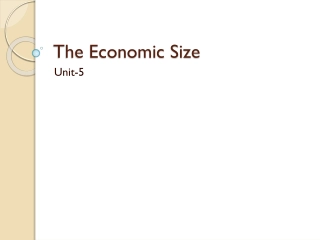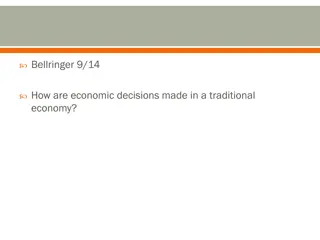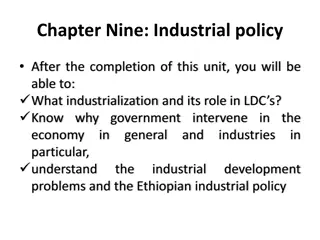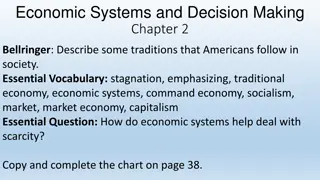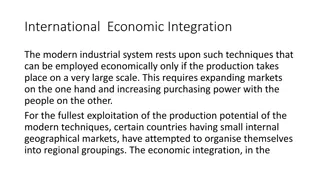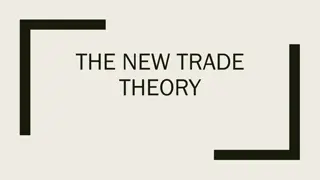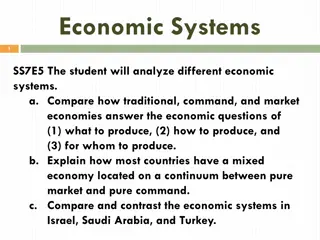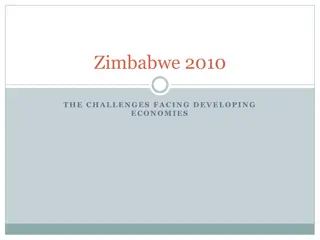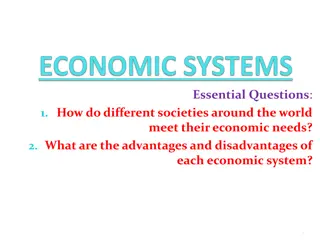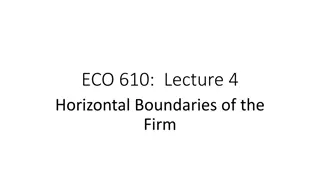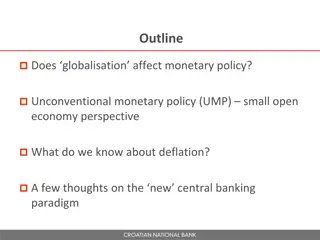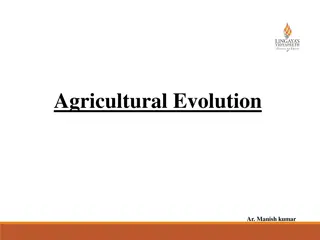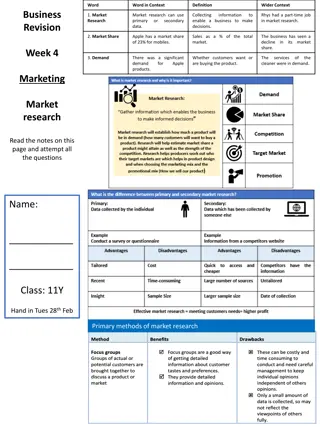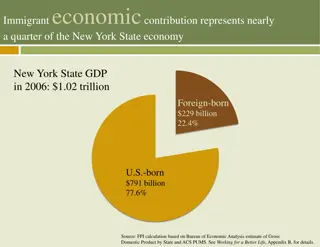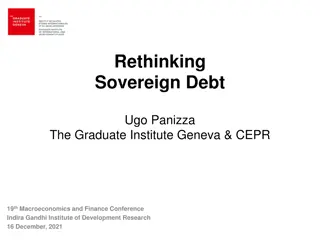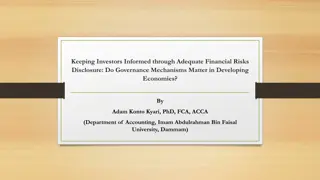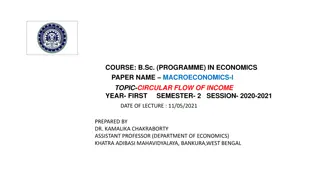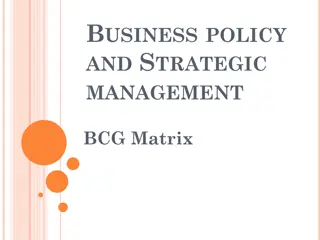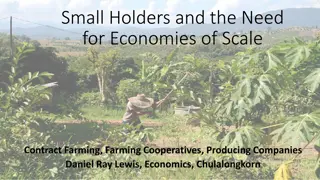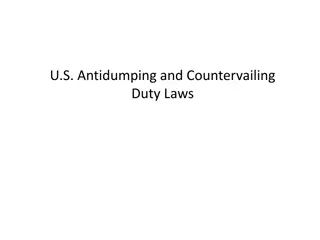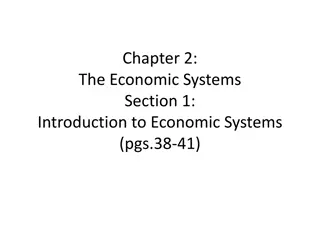The Economic Size
Economies of scale and how it can benefit businesses. Learn about the different types of economies of scale and their effects on production costs. Discover the sources that can help achieve economies of scale.
1 views • 21 slides
Understanding Shock Absorption and Fiscal Sustainability in Small Open Economies
This presentation delves into a model of output, prices, public finance, and balance of payments in small open economies. It explores the impact of macroeconomic shocks, fiscal sustainability restoration, and financial stability maintenance. The model sheds light on policy responses to varying econo
0 views • 30 slides
Understanding Global Economic Convergence Trends: Insights from Jeffrey Frankel’s Keynote at G20 Global Financial Stability Conference 2021
Jeffrey Frankel discussed the potential impact of the pandemic on global economic convergence at the G20 Global Financial Stability Conference 2021. Despite a resilient world economy in the first half of 2021, downside risks persist due to monetary and fiscal stimuli. The divergence between Emerging
1 views • 17 slides
Economic Systems in the United Kingdom, Germany, and Russia
Economic decisions in traditional economies are based on customs and beliefs. The United Kingdom has a mixed market economy with a focus on service industries, while Germany's economy is export-based. Russia's economy leans towards a command system. By comparing these economic systems, one can see h
0 views • 11 slides
Understanding Industrialization and Its Role in Developing Countries
Industrialization is defined as the process of economic development that mobilizes national resources to create a modern, diversified domestic sector capable of high growth. It plays a crucial role in transforming economies, creating job opportunities, and increasing income levels in developing coun
4 views • 26 slides
Understanding Economic Systems and Decision Making
The chapter delves into different economic systems such as traditional, command, and market economies, exploring how each handles scarcity and decision-making. It discusses traditions in American society, essential vocabulary, advantages, and disadvantages of traditional economies, and the impact of
0 views • 34 slides
Benefits of Economic Integration
Economic integration involves the unification of distinct economies into a larger economic region through the removal of trade barriers. It leads to economies of scale, international specialization, qualitative improvement in output, expansion of employment, and improvement in terms of trade. These
0 views • 33 slides
The New Trade Theory and Economies of Scale in International Trade
The New Trade Theory, emerged in the 1970s, challenges traditional trade theories by emphasizing the role of increasing returns and economies of scale in international trade. It introduces the concept of industrial organization and imperfect competition to explain how countries trade not only based
0 views • 12 slides
Token Economies and Behaviour Modification in Custody: Evaluating Efficacy
This article explores the application of token economies in prisons as a behaviour modification technique based on operant conditioning. Token economies involve exchanging tokens for desired behaviours, aiming to replace undesirable actions with positive reinforcement. The use of increments, consist
0 views • 19 slides
Understanding Economic Systems and Their Impacts
Explore traditional, command, and market economies, and how they address economic questions. Understand the concept of mixed economies and their placement on a continuum between market and command systems. Compare economic systems in Israel, Saudi Arabia, and Turkey. Delve into essential economic vo
0 views • 17 slides
Challenges Faced by Developing Economies in Post-Conflict Zones
Addressing the economic, social, and security challenges in developing economies post-conflict, including issues such as aid effectiveness, resource dependency, governance, and civil wars. The importance of foreign investment, multilateral cooperation, and possible solutions to foster economic growt
0 views • 20 slides
Understanding Community Wealth Building for Socially Just Economies
Community Wealth Building focuses on fairer, socially just economies through progressive concepts like anchor institutions, plural ownership, and fair labor markets. It promotes broad ownership and distribution of wealth for national and international benefits, including productivity, social, and en
0 views • 28 slides
Understanding Economic Systems and Their Impacts on Societies
Explore how different societies meet their economic needs through traditional, free enterprise, and communist economic systems. Learn about the advantages and disadvantages of each system, from the customs-based decisions in traditional economies to the government-controlled operations in communist
2 views • 17 slides
Economies of Scale in Dutch Primary Education: A Multi-level Cost Model
This paper explores economies of scale in Dutch primary education, focusing on school boards and school compositions. The study examines the impact of school size variations on cost determination at both levels, considering the challenges of limited input data availability. Different solutions are p
3 views • 16 slides
Global Economic Update: High-income Economies Accelerating, Developing Countries Facing Challenges
The global economic outlook presents a contrast between high-income economies accelerating in growth while developing countries encounter challenges due to headwinds and capacity constraints. Key messages highlight the need for structural reforms to enhance outcomes. Risks include fallout from the s
4 views • 34 slides
Structuration Analysis of Central Government Accounting Practices and Reforms in Emerging Economies: A Study from Nepal
Delve into the nuances of central government accounting practices and reforms in emerging economies, focusing on Nepal. The study explores why key stakeholders resist externally-driven changes, investigates the unintended consequences of reforms, and highlights the role of organizational actors in s
0 views • 21 slides
Understanding Horizontal Boundaries of Firms in Economics
Exploring the concept of horizontal boundaries in firm behavior, this lecture delves into Long-run Average Cost curve, economies and diseconomies of scale, optimal plant size, and the Minimum Efficient Scale. It discusses how economies of scale affect production costs and the relationship between ma
0 views • 25 slides
Globalisation's Impact on Monetary Policy and Central Banking Paradigm
Globalisation has reshaped monetary policy dynamics, influencing inflation pressures and the transmission of shocks across economies. Unconventional monetary policies in small open economies have challenged conventional theories, highlighting the complexity of managing monetary conditions. The inter
0 views • 24 slides
Super Premium Sorbet Marketing Plan
Product Description: Super Premium Sorbet offering seven flavors including Chocolate, Cranberry Blueberry, Mango, Raspberry, Strawberry, Orchard Peach, and Zesty Lemon in a 14-ounce container. Marketed as part of the Haagen-Dazs portfolio, available in North America, Asia, South America, and Europe.
0 views • 16 slides
The Evolution from Paleolithic Societies to Agricultural Revolution
Exploring the transition from small Paleolithic societies relying on gathering and hunting to the Agricultural Revolution that brought deliberate cultivation of plants and animals. The shift marked a revolutionary transformation in human life, impacting economies, environments, spiritual beliefs, an
0 views • 12 slides
Understanding Market Research for Business Success
Market research is crucial for businesses to gather information about their target market, customer needs, competition, and market trends. Primary and secondary research methods, market share analysis, demand assessment, and calculating market size are key aspects discussed in this content. Various
1 views • 5 slides
Immigrant Contributions to the New York State and City Economies
Immigrants play a significant role in the economies of New York State and City, contributing nearly one-quarter and nearly half of their respective economic outputs. They represent a substantial share of the working-age population, labor force, and GDP. Immigrants work across various job sectors, fr
0 views • 20 slides
Insights into the Greater Bay Area Project
The Greater Bay Area project, led by Paulo Canelas de Castro, delves into the ambitious vision and planning of creating a megalopolis to drive China's advancement. The project aims to integrate economies, contribute to the world's top economies, and potentially secure a G-20 seat. It aligns with oth
0 views • 27 slides
Entrepreneurship as Empowerment: Transforming Lives and Communities
Entrepreneurship, as defined by Dr. Michael H. Morris, is the recognition and pursuit of opportunities, creating value through unique resource combinations. Empowerment through entrepreneurship enables individuals to create their own jobs, identities, futures, and contribute to the world, leading to
0 views • 30 slides
Research Ethics in Informal Economies: Insights from Heather Settle's Fieldwork
Heather Settle's fieldwork in Cuba and Nairobi sheds light on the challenges of conducting research in informal economies. She highlights the need to protect the identities of research participants engaged in illegal activities for survival. Settle emphasizes the importance of safeguarding sensitive
0 views • 4 slides
Understanding Supply and Demand in Competitive Markets
Supply and Demand are crucial forces in market economies that determine prices and quantities of goods. This content explores the concept of competitive markets, the relationship between demand and price, and the impact of related goods on demand. It delves into market dynamics through examples such
0 views • 50 slides
Rethinking Sovereign Debt: Implications for Global Economies
Explore the complexities of sovereign debt in large advanced economies and EMDEs, analyzing key factors like external debt, currency mismatches, and domestic public debt. Delve into the consequences of traditional "original sin" borrowing practices and potential solutions for managing sovereign debt
0 views • 28 slides
Advancing Sustainable Economies through AI and Demographic Dividend Discussions
Explore the intersection of AI technology with discussions on the Demographic Dividend (DD), National Transfer Accounts (NTA), and population aging. Uncover the potential for AI to revolutionize the dissemination of information in these crucial areas while addressing existing flaws. Discover ways to
0 views • 13 slides
Governance Mechanisms and Financial Risks Disclosure in Developing Economies
Examining the impact of governance mechanisms on financial risk disclosure in developing economies, this study delves into theories, literature reviews, findings, policy implications, and conclusions. The research emphasizes the importance of adequate risk disclosure for investor trust and regulator
0 views • 9 slides
Understanding Circular Flow of Income in Different Sector Economies
The circular flow of income concept explains the continuous flow of goods, income, and expenditure within an economy. It involves the distribution of income among production units and households through factors like land, labor, capital, and entrepreneurship. The flow of payments and receipts varies
0 views • 6 slides
Understanding BCG Matrix: Market Growth and Relative Market Share
BCG Matrix, developed by Bruce Henderson of the Boston Consulting Group, categorizes business units into Question Marks, Stars, Cash Cows, and Dogs based on market growth and relative market share. Market share and market growth are crucial factors in determining a company's position in the market.
0 views • 31 slides
Difference Between Capital Market and Money Market: A Comprehensive Overview
The capital market and money market serve different purposes in the financial world. While the capital market provides funds for long-term investments in securities like stocks and debentures, the money market deals with short-term borrowing and lending of funds. The capital market acts as a middlem
0 views • 4 slides
Enhancing Smallholder Farming Through Economies of Scale and Cooperative Models
Smallholder farming in developing countries is crucial for food production and the livelihoods of many individuals. However, to compete effectively in the market, small farms need to adopt cooperative models, economies of scale, and advanced agricultural technologies. By forming farming cooperatives
0 views • 8 slides
Understanding Township Economies and Apartheid Border Industry Policies
Township economies consist of diverse enterprises predominantly characterized by informality and survivalist nature, with a significant number not lasting beyond 3 years. These economies have birthed successful black entrepreneurs, transitioning from serving exclusively the township market. On the o
0 views • 17 slides
Understanding U.S. Antidumping and Countervailing Duty Laws
Explore the rationale behind the existence of antidumping and countervailing duty laws in the U.S., the roles of Commerce and the ITC in enforcing these laws, definitions of dumping and antidumping duty, and the nuances of fair comparison in determining unfair trade practices. Learn how these laws a
0 views • 58 slides
Economic Transition in Post-Communist Countries: A Quarter Century Review
This presentation by Oleh Havrylyshyn explores the progress and performance of post-communist economies since the fall of the Berlin Wall in 1989. It compares different countries' approaches to marketization, privatization, economic performance, and political transformation. The analysis highlights
1 views • 28 slides
Understanding Markets and Demand in Competitive Economies
Markets and competition play a crucial role in determining prices and quantities in economies. Supply and demand forces influence the price of goods like petrol, mangoes, and the number of tourists. A competitive market has many buyers and sellers, leading to negligible price influence from individu
0 views • 49 slides
Macroeconomic Policy Framework for Structural Transformation of African Economies
Structural transformation is essential for the development of African economies, involving shifts towards higher productive activities and inclusive growth. The process requires purposeful efforts to create articulated economies with coordinated economic activities and positive externalities. Emphas
0 views • 13 slides
Understanding Different Economic Systems
Introduction to economic systems reveals how societies address scarcity by determining what to produce, how to produce, and for whom. Traditional, command, market, and mixed economies are explored, highlighting their distinct approaches. Traditional economies rely on customs, command economies are g
0 views • 9 slides
Analysis of Renewable Energy and Energy Efficiency Markets in Emerging Economies
Analyzing the development and impact of renewable energy and energy efficiency markets in emerging economies such as China, Turkey, India, Brazil, South Africa. Focus on employment effects, policy instruments, market growth, and strategies in place.
0 views • 15 slides
